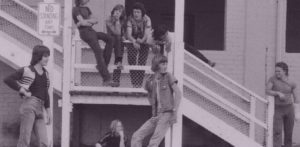 Back in 1977, Jesuit Social Services was born (as Four Flats) to respond to a real and important need. It was apparent that young men were exiting prison into homelessness with little support and no prospects of a job.
Back in 1977, Jesuit Social Services was born (as Four Flats) to respond to a real and important need. It was apparent that young men were exiting prison into homelessness with little support and no prospects of a job.
A quote by then Pentridge Prison Chaplain, Fr John Brosnan, became a guiding principle for our fledgling organisation. Fr Brosnan said: ‘Three things I have noted are needed by someone leaving prison: a place to live that is decent, a job they can handle, and lastly, and most important of all, friendship.’
The early work of Four Flats focused on just that. It provided a decent home, support to find and keep work, and a relationship that could be relied upon through thick and thin.
As Jesuit Social Services has grown over the years, we have kept true to these roots. Our justice work has expanded to include people across the life span. We are focused on keeping them out of prison wherever possible. If detention is necessary, we work with people on their release to provide housing and connection to family and community.
In addition, our dedicated education, training and employment programs have expanded to support some of these most marginalised job seekers prepare for work, find a job and manage the challenges they face in taking up new responsibilities and moving towards increasing independence.
Over time, the organisation’s initial focus on people in the justice system led us to address other problems, including mental illness, substance abuse issues and homelessness.
Through all of this work we have sought not just to address immediate needs but to influence long term change through sharing our knowledge and the experience of our participants with government and other decision makers. It has led to innovation in service delivery and significant policy changes over many years.
There is, of course, much more still to be done.
Men and boys make up around 93% of the prison population. In fact, many of the challenges we confront as a society are due to the behaviour of men and boys – not all men and boys, but too many. After almost 45 years of working to address these challenges, in 2017 we established The Men’s Project. Our goal was to support boys and men to live respectful, accountable and fulfilling lives free from violence and other harmful behaviour.
We recognised that as a community we rely too heavily on the justice system as a blunt tool to address men’s violence and anti-social behaviour after harm has occurred. We wanted to do more to stop the harm from occurring in the first place and support the growth of respectful and loving relationships.
The Men’s Project has three pillars: to undertake research in order to learn more about the attitudes and values that result in violence and harmful behaviour; to design, trial and evaluate targeted programs that intervene earlier to reduce harm and repair relationships; to foster discussions and help change community attitudes that drive harmful behaviour.
We’re proud of this work and the role we are playing in helping keep women, children and the wider community safe by supporting boys and men to break free from rigid and damaging ideas of masculinity and to be their best selves.
In this newsletter, you will read more about our work and we hope you will join us on our journey.

